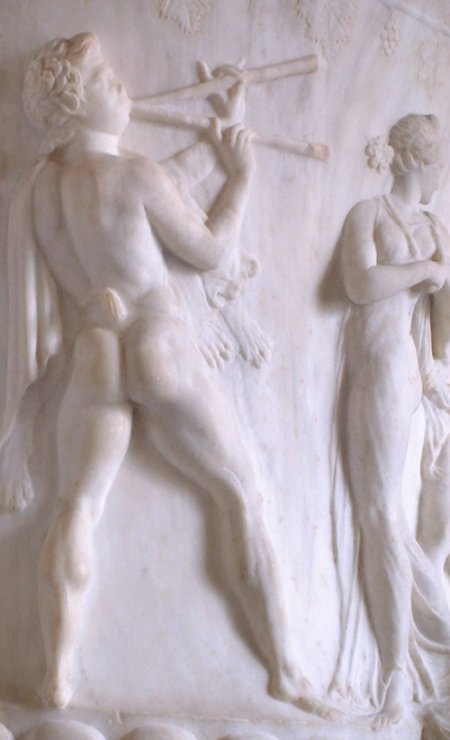- Aulos
Infobox Instrument
name=Aulos
names=
classification=Double reed
range=
related=
*Sorna
*Rhaita
*Suona
*Sopila
*Shawm
*Zurna The aulos (Greek "αυλός", plural "αυλοί", auloi) or tibia (
Latin ) was an ancient Greek musical instrument. Different kinds of instruments bore the name, including a single pipe without a reed called the "monaulos" ("μόναυλος", from "μόνος" "single"),cite journal | last = Howard | first = Albert A. | year = 1893 | title = The Αὐλός or Tibia | journal = Harvard Studies in Classical Philology | volume = 4 | pages = 1–60 | url = http://www.jstor.org/view/00730688/ap020004/02a00010/0 | format = GIF | accessdate = 2006-08-16 | doi = 10.2307/310399] and a single pipe held horizontally, as the modern flute, called the "plagiaulos" ("πλαγίαυλος", from "πλᾰγιος" "sideways"), but the most common variety must have been a reed instrument. Archeological finds and other evidence indicate that it was usually double-reeded, like anoboe ,cite book |last= West |first= Martin L. |title=Ancient Greek Music |publisher=Clarendon Press |year= 1992 |month= January |isbn= 0-19-814975-1 |pages= 81-5 ] although simple variants with a singleclarinet reed cannot be ruled out. Although sometimes embraced, not unlike thelyre , by aristocrats with sufficient leisure to practice it, from the later fifth century on the aulos became chiefly associated with professional musicians, often slaves.The aulos accompanied a wide range of Greek activities: it was present at sacrifices, dramas and even wrestling matches, for the broad jump, the discus throw, sailor's dances on
trireme s.Plato associates it with the ecstatic cults ofDionysus and theKorybantes . In his writings, Plato banned the aulos from his Republic but reintroduced it in "Laws".In mythology,
Marsyas thesatyr or "papa selenus" was supposed to have invented the aulos, or else picked it up afterAthena had thrown it away because it caused her cheeks to puff out and ruined her beauty. In any case, he challengedApollo to a musical contest, where the winner would be able to "do whatever he wanted" to the loser - Marsyas's expectation, typical of a satyr was that this would be sexual in nature. But Apollo and his lyre beatMarsyas and his aulos. And since the pure lord ofDelphi 's mind worked in different ways than Marsyas's, he celebrated his victory by stringing his opponent up from a tree andflaying him alive. King Midas got donkey's ears for judging Marsyas as the lesser player. Marsyas' blood and the tears of the Muses formed the river Marsyas in Asia Minor.This tale was a warning against committing the sin of "
hybris ", or overwhelming pride, in that Marsyas thought he might win against a god. Strange and brutal as it is, this myth reflects a great many cultural tensions that the Greeks expressed in the opposition they often drew between the lyre and aulos: freedom vs. servility and tyranny, leisured amateurs vs. professionals, moderation (sophrosyne ) vs. excess, etc. Some of this is a result of 19th century AD "classical interpretation", ie. Apollo versus Dionysus, or "Reason" (represented by the kithara) opposed to "Madness" (represented by the Aulos). In the temple to Apollo at Delphi, there was also a shrine to Dionysus, and his Maenads are shown playing the Aulos, on drinking cups, but Dionysus is sometimes shown holding a kithara or lyre. So a modern interpretation can be a little more complicated than just simple duality.It should be noted, however, that this opposition is mostly an Athenian one. We might surmise that things were different at Thebes, which was a center of aulos-playing. And we know that at
Sparta – which had no Bacchic or Korybantic cults to serve as contrast – the aulos was actually associated with "Apollo", and accompanied the kings into battle.References
External links
* [http://didaskalia.open.ac.uk/issues/vol2no2/Neuman.html "The Aulos and Drama: A Performer's Viewpoint," by Philip Neuman]
* [http://www.oeaw.ac.at/kal/agm/ "Ancient Greek Music - The Aulos, with sound examples"]
Wikimedia Foundation. 2010.
